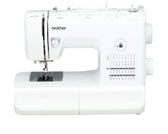XR37NT
FAQs & Troubleshooting |
Tangled thread on wrong side of fabric
Symptom
-
The thread becomes tangled on the wrong side of the fabric.
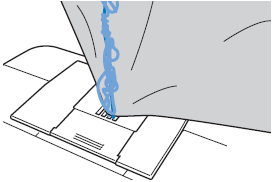
- After starting sewing, a rattling noise is made and sewing cannot continue.
-
Looking under the fabric, there is tangled thread in the bobbin case.
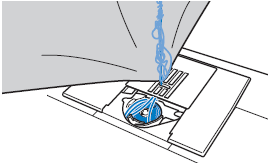
Cause
Incorrect upper threading
If the upper thread is incorrectly threaded, the upper thread passed through the fabric cannot be firmly pulled up and the upper thread becomes tangled in the bobbin case, causing a rattling noise.
Remedy/check details
Remove the tangled thread, and then correct the upper threading.
Removing the tangled thread
-
Turn off the sewing machine.
-
Remove the tangled thread. If it cannot be removed, cut the thread with scissors.
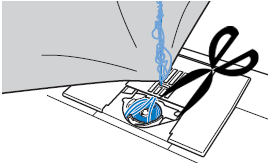
For details, refer to "How do I clean the machine? (Cleaning the race)".
-
If the threads remain under the needle plate, remove the needle plate, and then remove the threads.
-
Raise the presser foot lever to raise the presser foot.
-
Remove the upper thread from the machine.
-
If the needle plate and the bobbin case were removed from the machine, correctly install the bobbin case and attach the needle plate.
For details, refer to "How do I clean the machine? (Cleaning the race)".
- If the bobbin was removed from the bobbin case, correctly install the bobbin.
Threading the upper thread
[1] Preparing for threading
-
Turn off the sewing machine.
-
Raise the presser foot lever to raise the presser foot.
-
Raise the needle to its highest position by turning the handwheel toward you (counterclockwise).
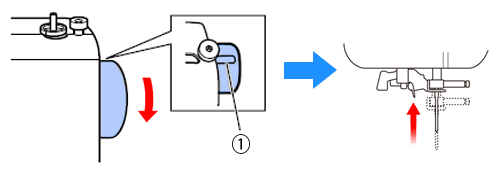
(1) Turn toward you so that this mark points up to the highest position.Be sure that the presser foot is raise and the needle is correctly raised. If the operation is not performed properly, it may cause troubles during sewing and poor sewing results.
[2] Threading the upper thread
-
Correctly set the spool of thread to the spool pin.

- If the spool is not positioned so that the thread unwinds correctly, the thread may become tangled around the spool pin and the thread or needle may break.
- If the spool cap that is used is smaller than the spool, the thread may catch, for example, on the notch in the spool, or the needle may break.
-
While holding the spool with your right hand, pull the thread with your left hand, and then pass the thread under the thread guide A.
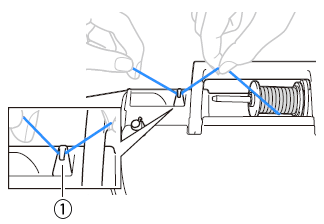
(1) Thread guide "A" -
Pass the thread under the thread guide B from the back to the front.
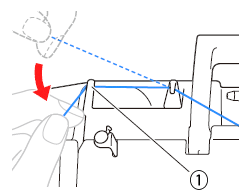
(1) Thread guide "B" - Hold the thread with your right hand so that there is no slack in the thread that is pulled out, and then pass the thread under the thread guide B with your left hand.
-
Thread the machine by guiding the thread along the path indicated by the number on the machine.
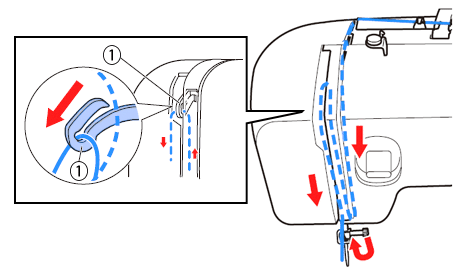
(1) Thread take-up lever -
Make sure you guide the thread through the thread take-up lever from right to left as shown in the illustration above.
-
Make sure you guide the thread through the thread take-up lever from right to left as shown in the illustration above.
-
Put the thread behind the guide above the needle.
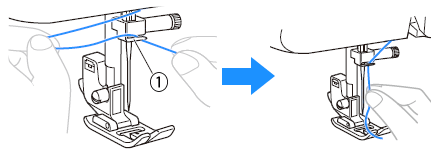
(1) Needle bar thread guide
[3] Threading the needle
-
Lower the presser foot lever.
-
Make sure that the mark on the wheel points up as shown in the following illustration.
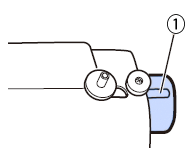
(1) Mark on the wheel -
While lowering the needle threader lever, hook the thread onto the guide.
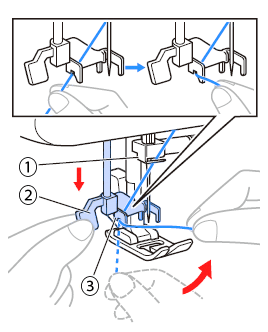
(1) Needle holder
(2) Needle threader lever
(3) Guide -
Pull down the needle threader lever as much as possible, and then turn the lever toward the back of the machine (away from you). Make sure that the hook passes through the eye of the needle and grabs the thread.
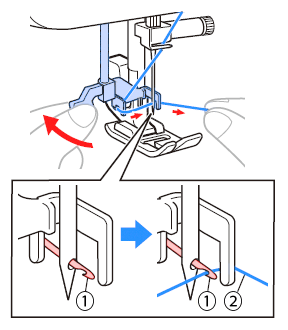
(1) Hook
(2) Thread
-
While lightly holding the thread, turn the needle threader lever toward the front of the machine (toward you). The hook will pull the thread through the needle.
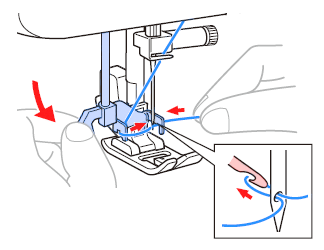
-
Raise the needle threader lever.
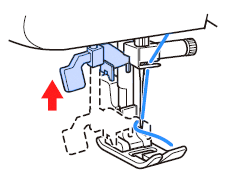
-
Pull the loop of the thread passed through the eye of the needle toward the rear of the machine.
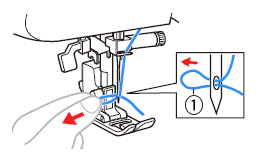
(1) Loop of thread -
Raise the presser foot lever.
-
Pass the end of the thread through and under the presser foot, and then pull out about 10 cm (approx. 4 inches) of thread toward the rear of the machine.
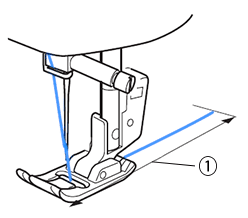
(1) 10 cm (4 inches)
